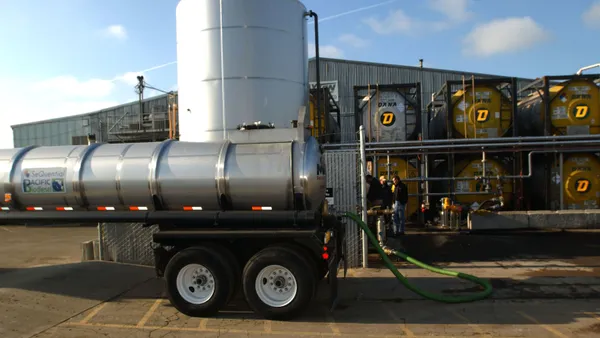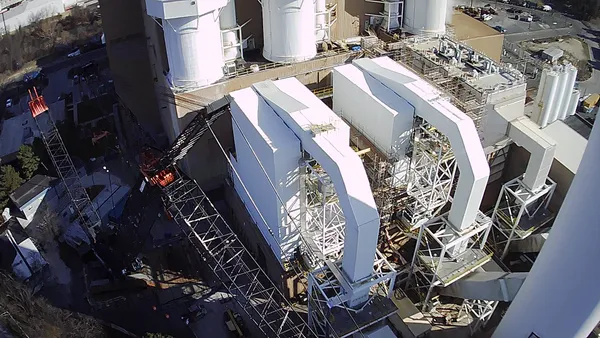UPDATE: August 14, 2019: The Rensselaer County Legislature voted to approve an amendment to its previous one-year moratorium on new waste facilities within one mile of the Hudson River. The ordinance now covers any areas near tributaries of the Hudson or drinking water sources, which the Times Union reports effectively includes the entire county. While this law won't affect any existing facilities, it does apply to a proposal from BioHiTech Global as well as any potential anaerobic digester projects.
Dive Brief:
- The future of a planned $35 million BioHiTech project in New York's Hudson Valley appears murky after the Rensselaer County Legislature approved a one-year moratorium on new solid waste facilities within one mile of the Hudson River, as reported by the Times Union.
- BioHiTech was eyeing the Rensselaer site (500 feet from the Hudson) for its second "high efficiency biological treatment" (HEBioT) facility. The company pulled plans for another project in Orange County, New York earlier this year after town board rescinded a purchase agreement due to environmental concerns, as reported by the Times Herald-Record.
- The Rensselaer City planning commission unanimously approved a special use permit for the facility in September 2018. Public outcry has prompted the county and some city officials — including Rensselaer Mayor Richard Moone —to question that decision, according to Northeast Public Radio.
Dive Insight:
BioHiTech's process, whic is said to convert 45% of the waste stream to an EPA-approved engineered fuel, has been pitched as a potential alternative for regions with tight disposal capacity. The company’s first facility in West Virginia began taking waste this spring and produces fuel for a cement plant.
The local law establishing the moratorium received unanimous approval from the county legislature on July 9 and became effective immediately.
"I am concerned with the impacts this project may have on the residents of Rensselaer and on the Hudson River," Mike Stammel, the legislative chair and sponsor of the local law, told Waste Dive via email. "The BioHiTech process is still fairly new and untested in the U.S."
The local law requires public hearings to determine what solid waste management safeguards are needed to protect public health and the environment in the future. An amendment to the local law will likely see a vote in August or September, and has support from both the legislature's minority and majority parties.
"This amended (local law) will be more comprehensive and offer more protections to the all tributaries of the Hudson and drinking water sources in Rensselaer County," said Minority Leader Peter Grimm via email.
The amendment further targets the BioHiTech site, specifically naming facilities that use waste as a "fuel product" and prohibiting local and state approval of such operations. BioHiTech is currently waiting for the New York Department of Environmental Conservation to sign off on its permit.
If the plan moves forward, the company plans to build a 72,000 square-foot HEBioT plant on 23 acres, with construction wrapping in late 2020. BioHiTech projects $12 million in annual revenue at the site and an 80% reduction in total waste sent to landfills.
Troubles with Hudson River pollution, as well as multiple enforcement actions and fines against Waste Connection's local Dunn Mine and C&D Landfill, have stoked concerns about perceived environmental dangers that could come from this new facility.
The proposed BioHiTech plant is located on the former location of a state Superfund cleanup, which affected the nearby river. Policymakers worry about BioHiTech's plans to pierce the site's protective barrier.
Meanwhile, municipalities in the region are feeling pinched when it comes to waste disposal. The Rapp Road Landfill in Albany is projected to reach capacity by 2026. New York State's 27 active municipal waste landfills are estimated to have a collective 23 years of capacity remaining without future expansions.
"The entire country is in need of new options for disposal of municipal solid waste, particularly the north east United States," said BioHiTech Global CEO Frank E. Celli in a statement responding to multiple questions about the moratorium. "Our technology is a cost effective and more environmentally sound solution for any area of the country in search of disposal solutions."














